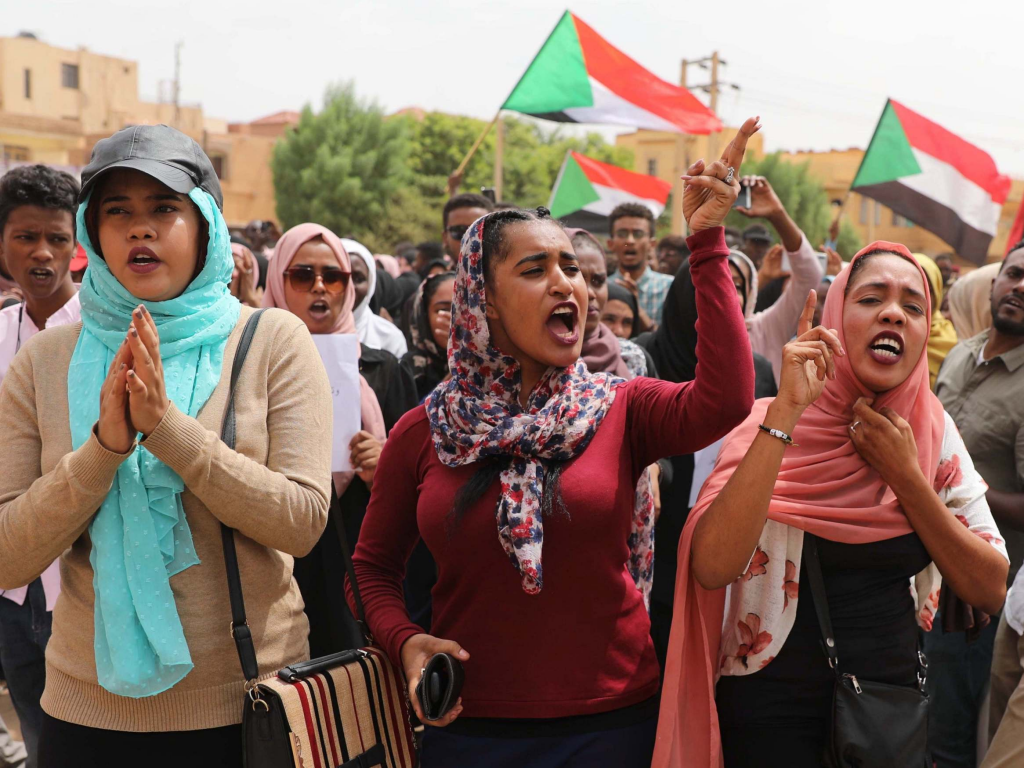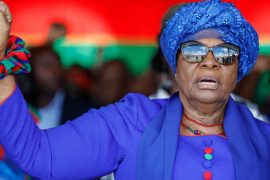By Miracle Nwankwo
After organizing the protests that ousted the three-decade rule of Sudan’s autocratic President Omar al-Bashir on 11 April 2019, Sudanese women are playing a prominent role in the country’s new transitional government, as they seek to overturn many of the restrictive Islamic laws that stifle women’s rights enforced by the former government.
Before the peaceful protest began, Al-Bashir who came to power in 1989 in an Islamist-backed military coup, adopted a harsh interpretation of Islamic law that disallowed women to participate meaningfully in daily life.
According to BBC, “A 2017 report by two charities described the restrictions as a blend of legal and moral prohibitions ‘designed to exclude and intimidate women from actively participating in public life’.
They gave the authorities sweeping powers to arbitrarily control what women wore, whom they spoke to and saw, and any job they might hold – with any perceived offender facing punishment by flogging, or in rare cases stoning and even execution.”
To maintain control, Bashir’s government placed restrictions on daily life and political activity. These rules were dubbed the “red line” by the Sudanese and anyone who broke the rules while expressing their political or civil independence, crosses the red line and is severely punished.
A report by the Human Right Watch in 1996 explained that “The red line is enforced under the National Security Act, which allows security agents to arbitrarily detain anyone for up to six months without judicial oversight in secret detention centres referred to as “ghost houses,” where torture and ill-treatment are commonplace.”
Amid all these, women were the most traumatized as they lost their voices and purpose of living, which forced them to join the peaceful protest that began on 19 December 2018.
With the new government in place, women seem to be gaining grounds and may achieve a great level of equality in the country.
According to a Human Rights Watch’s expert staff, “the new government is committed to several legal reforms, including changes needed to achieve gender equality. Family and inheritance laws clearly discriminate against women, limiting their ability to inherit property equally.”
In affirming the assertion, the country appointed a woman as Minister of Foreign Affairs in the person of Asma Mohammed Abdullah. Abdalla, a veteran diplomat who was dismissed by former president Al Bashir in 1991, became Sudan’s first female foreign minister as the country transitions to civilian rule.
Abdalla had served as a diplomat in several overseas Sudanese missions, including at the United Nations, in Morocco and Stockholm.
She had part of her studies in the United States and Sudan. She became one of the first three women to join Sudan’s foreign ministry as a diplomat after graduating from Khartoum University in 1971 with a degree in economics and political science.
After she was sacked by Al Bashir, she worked with several regional organisations including the Arab League and in 2009, she set up a bureau offering translation services.
She was recently sworn in as a member of the country’s new 18-member cabinet with four other women including Sudan’s first female chief justice, Nemat Abdullah Mohamed Khair, who is also the first female chief justice in the Arab world, and the fifth in Africa. The government have also drafted a constitution which sets a minimum 40 per cent quota for women in the future Transitional Legislative Council.
However, even with all of these appointments, Sudanese women are still marching to amend the laws and restore the rights taken from them under the strict Islamic code enforced by Bashir’s government, said VOA.
According to Samahir Elmubarak, Chief of Pharmacists Union under the Sudanese Professional Association (SPA), one of the key groups who played a key role in the removal of Bashir’s government. She tells VOA that she does not think that they have reached the level where they should stop protesting.
“The same motivation that empowered the people to overthrow Bashir’s regime is the same motivation that is pushing the people to continue to reach the revolution walls of freedom, peace and justice,” she said.
Their quest for a sustainable and generational change is hinged on the sacrifices paid by their loved ones who died fighting for these revolution goals.
However, aside from achieving those revolution goals, this movement will lead to many attainments for women in the country including:
Gender Equality: most of the things we now enjoy today were as a result of the fights of many heroes past. For example, the killing of twins in Nigeria was brought to an end because a compassionate and hardworking woman went the extra mile for mothers with twin children. The dedicated efforts of the Sudanese women will not only place women at the front row of government but also catapult their value on many fronts.
The girl-child: this movement will make an indelible impact on the worth of girl child in the society. The girl-child will not be sidelined as the society will come to grasp the understanding of the power and essence of women in the country. This will amount to addressing the unique challenges girls face and to promote girls’ empowerment and the fulfilment of their human rights.
Inclusion in Decision making: “According to the World Economic Forum in 2016, only 59% of the gender gap in economic opportunities has been closed around the world. At the current rate of change, it will take another 170 years to close it,” reports Intereconomics. Perhaps, the Sudanese women protest might move an inch closer to the 170 years projected by the WEF if they do not give up.
Their fight will make a lot of impact in decision-making processes in the country both in the present and future. By their continuity, they are able to uproot invisible barriers which prevent women from reaching upper-level positions which may produce not only more equality but also substantial efficiency gains.
Women-owned businesses: Women have a strong potential role in many aspects of economic development if given the chance to express these potentials. Women entrepreneurs face many obstacles that their male counterpart does not face. This has crippled many women-owned businesses in the continent and in-turn stifles the economy.
Following the end of the strict Bashir’s government that restricted women from many public activities, many women in the country will begin to consider starting their own enterprise with the freedom they have attained. However, it will be disheartening for them when they begin to discover these obstacles which they may not have foreseen beyond the Bashir’s restriction.
Therefore, their fight may destroy stereotypic ideologies that give authorities and investors a mindset that women are incapable as men. So when they seek loans and equal chance to do great things it will not be withheld from them.
Finally, there are many beneficial sides in the Sudanese women pursuit of which when attained will move Sudan from being one of the poorest countries in the world to the countries at the fore. For example, the United Nations last year ranked Sudan 167th out of 189 in its Human Development Index, this amongst others are tied to the continuity of the Sudanese women protest.
In the words of Amira Kabous, Deputy Chief of the December Revolution Martyr’s Organisation of Sudan; “We will continue until we achieve all of the revolutions that our children sacrificed for, and restore the rights till we see Sudan the way our children dreamt about and we all are dreaming about.”





Comments are closed.